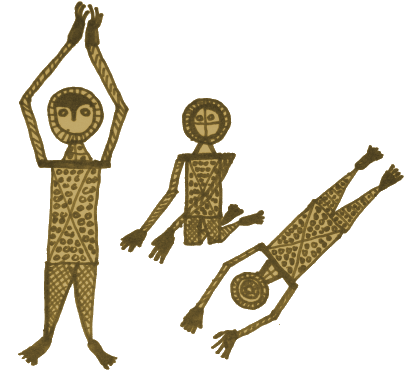
Return to Home Page
5 LIGHTS: The 5 Lights are the method used here to structure and frame reality. It is used to structure time, cross reference philosophies, balance food, orchestrate farming, and establish purification events. It has a long history of use among thoughtful humans. In Bon, Pythagorean, Gnostic, Manichaean, Buddhist, Taoist & Jain philosophy, the Five Lights or Elements are the building blocks of everything in the Universe. This System is ordered around these Lights. (Many of the allocations are unique to this system and differ from other 5 Element Systems.) For further associations of things under the heading of the five Lights, see 5 Light Associations in various Spiritual Paths.
It is important to note that the categorizing of things into fives here is not dependent on their outer manifestation as in some systems. For instance, the Chinese system of 5 elements often categorizes food solely by their outer 5 colors. Here food is categorized by underlining botanical realities - something that was not available before modern science. This five fold system is inspired by many ancient viewpoints, but is not constrained by them. Where science has made available deeper realities, deviation from traditional allocations has been made based on new information unavailable to the ancients. A global awareness of cultural and historical limitations and miopic viewpoints has made five fold analysis of larger and larger concepts and patterns possible.
So this Teaching is structured around the concept
of the "5 Lights". These 5 Lights form the backbone and structure
of this system. These 5 Lights have 5 colors, 5 tastes, 5 stars, 5 seasons,
5 Religions, and so on. Since everything is organized around this five-fold
system, it is worth taking a moment to introduce these Lights. They are
not just the 5 elements of Pythagoras and the Greeks and states of matter
like solid, liquid, gaseous, but indicate something different:
Some of the river civilizations also categorized
things as male and female, or yin and yang, which is something also used
in this system. For example: Aramaic esoteric movements of the middle east
considered barley a male grain, and wheat a female, and emphasized
barley and critiqued wheat as a "Greek" food. Barley is emphasized in this
system as well, but not for this reason. Here we will speak mainly
of the five fold division of things even tho we also recognize a yin yang
aspect to each of the five as well. The various Mountains often had an
origin of all things tradition that placed the five lights at the beginning
of things. The system here seeks to delve down to the core essence of things
and all phenomenah, including our own consciousness. Having foundational
traditions that echo this approach is informative. The tradition of seeing
things as manifestations of five root energies manifest in most of the
5
Mt regions: The Bonpos of Tibet categorize almost everything into 5
buddha families or 5 elements. The Pythagoreans and Gnostics were known
to acknoweldge 5 elements as well. Manichaeans were famous for their 5
Lights and fivefold categorization of everything. Zen practicioners saw
things organized by their five Dhyani Buddhas, and the Mandaeans had their
5 Kings of Light and 5 Kings of darkness.
The propensity to delude oneself, to blindly accept false traditions,
and to yield ones core values to the "group" is very strong. It is an inbred
part of the human psyche. No one is totally immune. It pervades all religious
thinking. Even the best spiritual paths contain erroneous ideas and customs.
By simultaneously working with 5 or more diverse spiritual Paths we open
ourselves up to a check and balances system that highlights universal common
themes as well as exposes individual weaknesses and cultural oddities that
bear no real meaning on the road to individualization. Sometimes
a Path will have a unique insight into something valuable, or a practice
or tradition that is either meaningless or even harmful. Here are a few
random examples:
|
|
|
|
| Bon, Ngakpa, Shavaite | Escaping the duality of the evolutionary mind bequeaths liberation | Guru's should be worshipped or blindly followed |
| Pagan, Gnostic, Jungian | Archetypes lead us to greater understanding of ourselves and all life | Baser instincts are to be honored and accepted |
| Zorastrian, Manichaean, Sufi | Extracting the light essence out of the mixture leads to liberation | Aloof distancing from work causes undo dependence and separation from others |
| Shinto, Tao, Zen | Interaction with the natural world is indispensable to Enlightenment | Woman can not even go onto holy mountains to seek awareness of Fudo |
| Pythagorean, Mandaean, Qabbalah | Mathematical, categorization, and sorting of symbols unveils hidden connections | Obsession with ritual purity leading to OCD (Obsessive compulsive disorders) |
